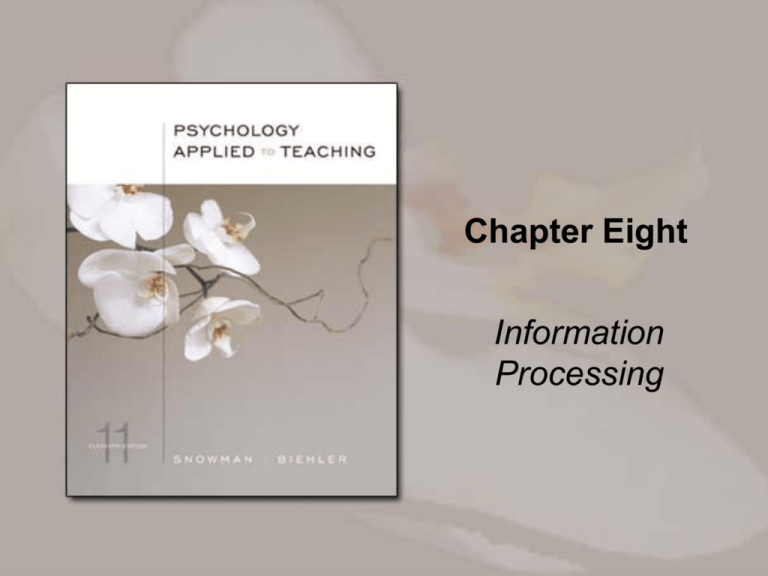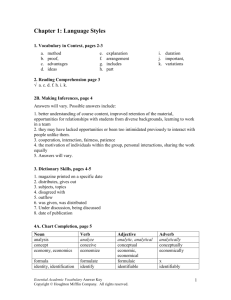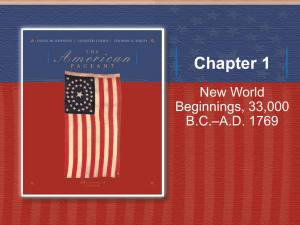
Chapter Eight
Information
Processing
How well do we remember
what we learn in school?
Copyright © Houghton Mifflin Company. All rights reserved.
5-2
Overview
• The information processing view of learning
• A model of information processing
• Metacognition
• Helping students become strategic learners
Copyright © Houghton Mifflin Company. All rights reserved.
5-3
Information processing view
of learning: Assumptions
• Information focuses on the mind of the student
– Information is processed in steps
or stages
– There are limits on how much information can be
processed at each stage
– The human information processing system is
interactive
Copyright © Houghton Mifflin Company. All rights reserved.
5-4
Copyright © Houghton Mifflin Company. All rights reserved.
5-5
A model of information processing (p. 239)
Copyright © Houghton Mifflin Company. All rights reserved.
5-6
The sensory register
• Capacity
– Very large
• Duration
– 1 to 3 seconds
• Contents
– Information perceived by the sensory receptors
(encoded as perceived)
Copyright © Houghton Mifflin Company. All rights reserved.
5-7
The sensory register
and its control processes
• Recognition
– Noting key features of a stimulus and relating
them to already stored information
• Attention
– Selective focusing on a portion of the
information currently stored in the sensory
register
Copyright © Houghton Mifflin Company. All rights reserved.
5-8
Short-term memory (working memory)
• Capacity
– 7 +/- 2 chunks of information
• Duration
– 20 to 30 seconds
• Contents
– What you are currently thinking about
(information from the sensory register and
information from long term memory)
Copyright © Houghton Mifflin Company. All rights reserved.
5-9
Short-term memory
and its control processes
• Rehearsal
– Maintenance rehearsal —repeating
information over and over again; no effect on
long-term memory storage
– Elaborative rehearsal —relating new
information to knowledge already stored in
long-term memory
Copyright © Houghton Mifflin Company. All rights reserved.
5-10
Short-term memory
and its control processes
• Elaborative Rehearsal
– Organization
• Organizing information into chunks (related items)
so that more information can be stored and thus
remembered
– Meaningfulness
• Organizing material and relating it to ideas and
experiences already known
Copyright © Houghton Mifflin Company. All rights reserved.
5-11
Short-term memory
and its control processes
• Elaborative Rehearsal Cont’d
– Visual imagery encoding (Paivio - dual coding)
• Generating mental images of objects, ideas, and
actions to aid in the storage of memories
Copyright © Houghton Mifflin Company. All rights reserved.
5-12
Long-term memory
• Capacity
– Unlimited
• Duration
– Permanent, long-term
• Contents
– Schemata – an abstract structure of
information
Copyright © Houghton Mifflin Company. All rights reserved.
5-13
What is metacognition?
Metacognition is…
our knowledge about attention, recognition,
encoding, storage, and retrieval and how
those operations might best be used to
achieve a learning goal.
Copyright © Houghton Mifflin Company. All rights reserved.
5-14
Learning Tactics for helping Students
become Strategic Learners
• Memory-directed tactics
– Techniques that help produce accurate storage
and retrieval of information
• Comprehension-directed tactics
– Techniques that aid in understanding the
meaning of ideas and their interrelationships
Copyright © Houghton Mifflin Company. All rights reserved.
5-15
Memory-directed tactics
• Rehearsal
– Rote rehearsal
– Cumulative rehearsal
• Mnemonic devices
–
–
–
–
–
Rhyme
Acronym
Acrostic
Method of loci
Keyword
Copyright © Houghton Mifflin Company. All rights reserved.
5-16
Comprehension-directed tactics
• Questioning
– Self-questioning
– Peer questioning
– KWL
• Notetaking
– Summarizing
– Outlining
Copyright © Houghton Mifflin Company. All rights reserved.
5-17
Self-questioning stems
(King, 1992) p. 281
•
•
•
•
•
•
•
•
•
What is a new example of…?
How would you use … to…?
What would happen if…?
What are the strengths and
weaknesses of…?
What do we already know
about…?
How does … tie in with what we
learned before?
Explain why…
Explain how…
How does … affect …?
•
•
•
•
•
•
•
•
•
What is the meaning of…?
Why is … important?
What is the difference between …
and …?
How are … and … similar?
What is the best …, and why?
What are some possible solutions
to the problem of …?
Compare … and … with regard to
…?
How does … cause …?
What do you think causes…?
Copyright © Houghton Mifflin Company. All rights reserved.
5-18
The components
of a learning strategy
•
•
•
•
•
•
Metacognition
Analysis
Planning
Implementation of the plan
Monitoring of progress
Modification
Copyright © Houghton Mifflin Company. All rights reserved.
5-19


